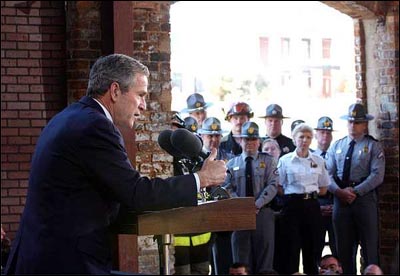
| President George W. Bush speaks during his visit with first responders, including rural police and fire officials, in Greenville, South Carolina, Wednesday, March 27, 2002. White House photo by Eric Draper. |
First Responders
Mutual Aid Agreements: Support for First Responders outside Major Metropolitan Areas
Terrorists can strike anytime, anywhere. Crop dusters, power generating plants, dams and reservoirs, crops, livestock, trains and highways are among the resources that could be targets. Homeland security in the heartland is just as important as homeland security in America's largest cities.
First responders from communities outside major metropolitan areas who must protect large geographic areas with small populations face many response challenges. In fact, over half of our firefighters protect small or rural communities of fewer than 5,000 people. Many of these communities rely upon volunteer departments with scarce resources. Fewer than 10% of counties surveyed by the National Association of Counties said they are prepared to respond to a bioterrorist attack.
One of the best strategies to build capability in communities outside major metropolitan areas is to develop mutual aid agreements to share resources. First responders from smaller communities need assistance in organizing and developing the unified command and control procedures and protocols necessary for operationally sound mutual aid. These agreements will enable neighboring jurisdictions to share specialized resources, rather than duplicate them in every jurisdiction.
President Bush's 2003 budget provides $140 million to assist these communities in planning and establishing mutual aid agreements. While mutual cooperation and mutual aid agreements have existed over the years in support of civil defense, fire, and National Guard activities, this is the first time that the federal government has directly supported the establishment of mutual aid agreements with federal resources.
As an established mechanism for sharing or pooling limited resources to augment existing capabilities and supplementing jurisdictions that have exhausted existing resources due to disaster, mutual aid processes will help ensure that jurisdictions across the United States can benefit from each other.s efforts to enhance their first response capabilities. Jurisdictions can use the funding provided under this initiative to create or improve their response capabilities, without duplicating their efforts. Many areas have little or no capability to respond to terrorist attack using weapons of mass destruction. Even the best prepared States and localities do not possess adequate resources to respond to the full range of terrorist threats we face.
>>More on Supporting First Responders
|
 |
 |
 |
|
 |
 |





